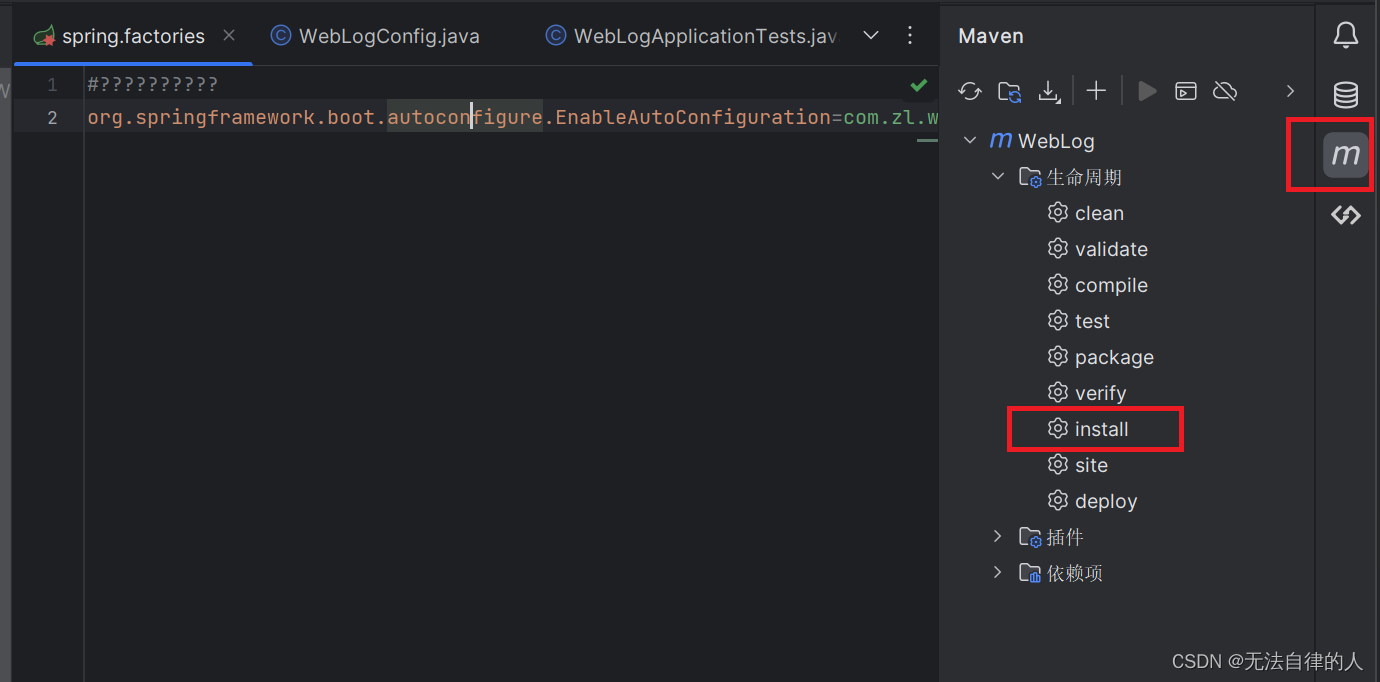【Spring Boot】Starter机制的使用及案例
一、引言
1、什么是SpringBoot Starter
????????SpringBoot中的starter是一种非常重要的机制(自动化配置),能够抛弃以前繁杂的配置,将其统一集成进starter,应用者只需要在maven中引入starter依赖,SpringBoot就能自动扫描到要加载的信息并启动相应的默认配置。starter让我们摆脱了各种依赖库的处理,需要配置各种信息的困扰。
????????SpringBoot会自动通过classpath路径下的类发现需要的Bean,并注册进IOC容器。SpringBoot提供了针对日常企业应用研发各种场景的spring-boot-starter依赖模块。
所有这些依赖模块都遵循着约定成俗的默认配置,并允许我们调整这些配置,即遵循“约定大于配置”的理念。
2、为什么要使用SpringBoot Starter
- 简化配置:通过使用Starter,开发者可以减少手动添加和配置依赖的工作量。Starter通常包含了许多相关的依赖项,以及一些配置模板和自动配置功能,使用者可以非常方便地将其引入到应用程序中,并快速地获得相关的功能。
- 统一管理:Starter能够将相关依赖和配置统一集成进一个模块,这使得项目的依赖管理更加清晰和有序。
- 自动配置:SpringBoot的Starter机制能够自动扫描并加载相应的模块信息,从而减少了开发者手动配置的工作量,提高了开发效率。
- 方便团队协作:由于Starter的使用,开发者无需关心复杂的依赖关系和配置,只需关注业务逻辑的开发,这有助于提高团队协作的效率。
3、应用场景
????????我们的日常开发工作中,可能会需要开发一个通用模块,以供其它工程复用。SpringBoot就为我们提供这样的功能机制,我们可以把我们的通用模块封装成一个个starter,这样其它工程复用的时候只需要在pom中引用依赖即可,由SpringBoot为我们完成自动装配。
常见应用场景:
- 通用模块-短信发送模块
- 基于AOP技术实现日志切面
- 分布式雪花ID,Long转String,解决精度问题
- 微服务项目的数据库连接池配置
- 微服务项目的每个模块都要访问redis数据库,每个模块都要配置redisTemplate
4、自动加载核心注解说明
SpringBoot的自动加载核心注解是@SpringBootApplication。这个注解是Spring Boot最核心的注解,用于标识这是一个Spring Boot应用,并开启Spring Boot的各项能力。
实际上,@SpringBootApplication注解主要组合了以下几个核心注解:
- @Configuration:表示这是一个配置类,Spring Boot会为这个类生成一个默认的bean定义。
- @EnableAutoConfiguration:这是Spring Boot自动配置的核心注解,它会根据项目的依赖情况自动进行bean的定义和属性的配置。
- @ComponentScan:这个注解用于扫描当前类所在的包及其子包,找到标注了@Component, @Service, @Repository等注解的类,并将其定义成bean。

5、命名规范
starter项目和SpringBoot工程结构没有什么区别。必须引入的依赖:
<dependency>
<groupId>org.springframework.boot</groupId>
<artifactId>spring-boot-configuration-processor</artifactId>
<optional>true</optional>
</dependency>spring-boot-configuration-processor 是一个注解处理器,用于处理 Spring Boot 配置类的注解,并生成配置属性的元数据。它在开发过程中起到以下几个重要的作用:
-
生成配置属性的元数据: 当你使用
@ConfigurationProperties注解来声明配置类时,spring-boot-configuration-processor会解析该注解,并生成与配置属性相关的元数据。这些元数据包括属性的名称、类型、描述、默认值等信息。这些信息可以帮助 IDE 在开发过程中提供代码提示、自动补全和验证功能。 -
提供配置属性的编译时验证: 使用
@ConfigurationProperties注解时,你可以使用其他注解(如@Value、@Valid等)来描述配置属性的约束条件。spring-boot-configuration-processor可以处理这些注解,并在编译时进行验证。这样,你可以在开发阶段及早发现配置属性的错误或不一致,而不是在运行时才遇到问题。 -
简化配置类的编写: 通过使用
spring-boot-configuration-processor,你可以更轻松地编写配置类。它会自动处理@ConfigurationProperties注解及其相关注解,生成属性的 getter、setter 方法,并提供默认的配置文件映射规则。这样,你可以专注于定义配置属性的结构和业务逻辑,而不需要手动编写重复的代码。 -
提升开发体验:
spring-boot-configuration-processor增强了开发工具的功能,例如在 IDE 中提供配置属性的智能提示、文档、类型检查等功能。这可以减少开发过程中的错误,并提高代码的可读性和可维护性。
spring-boot-configuration-processor 可以简化 Spring Boot 配置类的开发,提供编译时验证和开发工具的支持,从而改善开发体验并减少潜在的配置错误。它是 Spring Boot 框架中重要的辅助工具,帮助开发者更高效地处理配置属性。
SpringBoot官方命名方式:
spring-boot-starter-{模块名}例如:spring-boot-starter-web
二、综合案例
1、模拟短信发送
①创建配置类Properties
提供accessKeyId和accessKeySecret属性的getter、setter方法。
package com.zl.smsspringbootstart;
import lombok.Data;
import org.springframework.beans.factory.annotation.Value;
import org.springframework.boot.context.properties.ConfigurationProperties;
import org.springframework.stereotype.Component;
import org.springframework.stereotype.Controller;
@Data
//@Component
//@ConfigurationProperties 会自动去yml文件中找到需要的配置将它放到对应的属性中
@ConfigurationProperties(prefix = "sms")
public class SmsProperties {
/**
* 应用标识
*/
// @Value("${sms.key}")
private String key;
/**
* 应用密钥
*/
// @Value("${sms.secret}")
private String secret;
/**
* 关闭
*/
private String enable;
}②编写短信业务功能
service
package com.zl.smsspringbootstart.service; public interface ISmsService { /** * 发送短信 * * @param phone 要发送的手机号 * @param data 要发送的内容 */ void send(String phone, String data); }
接口实现impl
package com.zl.smsspringbootstart.service.impl; import com.zl.smsspringbootstart.SmsProperties; import com.zl.smsspringbootstart.service.ISmsService; public class SmsServiceImpl implements ISmsService { private SmsProperties smsProperties; //null public SmsServiceImpl(SmsProperties smsProperties) { this.smsProperties = smsProperties; } @Override public void send(String phone, String data) { String key = smsProperties.getKey(); String secret = smsProperties.getSecret(); System.out.println("接入短信系统,Key=" + key + ",Secret=" + secret); System.out.println("短信发送,phone=" + phone + ",data=" + data); } }
③创建自动配置类
@EnableConfigurationProperties注解的作用是@ConfigurationProperties注解生效。
如果只配置@ConfigurationProperties注解,在IOC容器中是获取不到properties配置文件转化的bean的。
package com.zl.smsspringbootstart;
import com.zl.smsspringbootstart.service.ISmsService;
import com.zl.smsspringbootstart.service.impl.SmsServiceImpl;
import org.springframework.beans.factory.annotation.Autowired;
import org.springframework.boot.autoconfigure.condition.ConditionalOnProperty;
import org.springframework.boot.context.properties.EnableConfigurationProperties;
import org.springframework.context.annotation.Bean;
import org.springframework.context.annotation.Configuration;
@Configuration
//开启配置加载
@EnableConfigurationProperties({SmsProperties.class})
//添加一个条件 sms.enable
@ConditionalOnProperty(prefix = "sms", name = "enable", havingValue = "true")
public class SmsConfig {
//控制当前的service是否加载到spring里面去
@Autowired
private SmsProperties smsProperties;
//@Bean 方法会在spring运行的时候自动执行,返回值会被放到spring容器中
@Bean
public ISmsService smsService() {
return new SmsServiceImpl(smsProperties);
}
}
④编写spring.factories文件加载自动配置类
在resources下新建META-INF文件夹,然后创建spring.factories文件。在该文件中加入如下配置,该配置指定上步骤中定义的配置类为自动装配的配置:
org.springframework.boot.autoconfigure.EnableAutoConfiguration=com.zl.smsspringbootstart.SmsConfig
其中AutoConfig是starter配置文件的类限定名,多个之间逗号分割,还可以\进行转义即相当于去掉后面换行和空格符号。
⑤打包

⑥其他项目引用
- 引入依赖
<dependency> <groupId>com.zl</groupId> <artifactId>sms-spring-boot-start</artifactId> <version>0.0.1-SNAPSHOT</version> </dependency> -
配置application.yml文件
enable如果为false则不使用# 配置 sms: key: 11115 secret: 100006 enable: true -
创建Junit测试
?package com.example.springboot01; import com.zl.smsspringbootstart.service.ISmsService; import com.zl.weblog.WebLogProperties; import org.junit.jupiter.api.Test; import org.springframework.beans.factory.annotation.Autowired; import org.springframework.boot.test.context.SpringBootTest; @SpringBootTest class Springboot01ApplicationTests { // 使用短信功能 @Autowired private ISmsService iSmsService; @Test void contextLoads() { iSmsService.send("137", "123456"); } } -
测试结果

2、基于AOP技术实现日志切面
①创建配置类Properties
enabled属性用于控制是否开关日志,请提供enabled属性的getter、setter方法。
package com.zl.weblog;
import org.springframework.boot.context.properties.ConfigurationProperties;
// 添加@ConfigurationProperties注解,将配置文件中的属性映射到WebLogProperties类中
@ConfigurationProperties(prefix = "spcloud.weblog")
public class WebLogProperties {
// 定义一个boolean类型的变量
private boolean enabled;
// 构造函数
public WebLogProperties() {
}
// 获取enabled属性
public boolean isEnabled() {
return enabled;
}
// 设置enabled属性
public void setEnabled(boolean enabled) {
this.enabled = enabled;
}
}②实现基于AOP技术的日志切面功能
package com.zl.weblog; import lombok.extern.slf4j.Slf4j; import org.aspectj.lang.JoinPoint; import org.aspectj.lang.annotation.AfterReturning; import org.aspectj.lang.annotation.Aspect; import org.aspectj.lang.annotation.Before; import org.aspectj.lang.annotation.Pointcut; import org.springframework.stereotype.Component; import org.springframework.web.context.request.RequestContextHolder; import org.springframework.web.context.request.ServletRequestAttributes; import javax.servlet.http.HttpServletRequest; import java.util.Arrays; @Aspect @Component @Slf4j public class WebLogAspect { //@Pointcut("execution(public * com.zl..controller.*.*(..))") // 定义一个切入点,拦截com.zl..controller.*.*(..)方法 @Pointcut("execution(* *..*Controller.*(..))") public void webLog() { } @Before("webLog()") // 在执行方法之前执行 public void doBefore(JoinPoint joinPoint) throws Throwable { // 接收到请求,记录请求内容 ServletRequestAttributes attributes = (ServletRequestAttributes) RequestContextHolder.getRequestAttributes(); HttpServletRequest request = attributes.getRequest(); // 记录下请求内容 log.info("开始服务:{}", request.getRequestURL().toString()); log.info("客户端IP :{}", request.getRemoteAddr()); log.info("参数值 :{}", Arrays.toString(joinPoint.getArgs())); } @AfterReturning(returning = "ret", pointcut = "webLog()") // 在执行方法之后执行 public void doAfterReturning(Object ret) throws Throwable { // 处理完请求,返回内容 log.info("返回值 : {}", ret); } }
③创建自动配置类
package com.zl.weblog;
//import com.zl.spcloudspringbootstarter.properties.WebLogProperties;
import org.springframework.boot.autoconfigure.condition.ConditionalOnMissingBean;
import org.springframework.boot.autoconfigure.condition.ConditionalOnProperty;
import org.springframework.boot.context.properties.EnableConfigurationProperties;
import org.springframework.context.annotation.Bean;
import org.springframework.context.annotation.Configuration;
/**
* @ConditionalOnProperty 配置属性a:
* 1:不配置a matchifmissing=false 不满足 matchifmissing=true 满足
* 2:配置a=false matchifmissing=false 不满足 matchifmissing=true 不满足
* 3:配置a=true matchifmissing=false 满足 matchifmissing=true 满足
*/
@Configuration
@EnableConfigurationProperties({WebLogProperties.class})
@ConditionalOnProperty(prefix = "spcloud.weblog",
value="enabled",matchIfMissing = true)
public class WebLogConfig {
@Bean
@ConditionalOnMissingBean
public WebLogAspect webLogAspect() {
return new WebLogAspect();
}
}④编写spring.factories文件加载自动配置类
在resources下新建META-INF文件夹,然后创建spring.factories文件。在该文件中加入如下配置,该配置指定上步骤中定义的配置类为自动装配的配置:
org.springframework.boot.autoconfigure.EnableAutoConfiguration=com.zl.weblog.WebLogConfig
其中AutoConfig是starter配置文件的类限定名,多个之间逗号分割,还可以\进行转义即相当于去掉后面换行和空格符号。
⑤打包

⑥其他项目引用
- 引入依赖
<!-- 切面--> <dependency> <groupId>com.zl</groupId> <artifactId>WebLog</artifactId> <version>0.0.1-SNAPSHOT</version> </dependency> -
配置application.yml文件
enable如果为false则不使用# 配置 spcloud: weblog: enabled: true -
创建Controller层测试
在这里可以使用自己的Controller层测试package com.example.springboot01.controller; import com.example.springboot01.entity.TBook; import com.example.springboot01.page.PageBean; import com.example.springboot01.service.TBookService; import com.github.pagehelper.PageHelper; import org.aspectj.lang.annotation.Aspect; import org.springframework.beans.factory.annotation.Autowired; import org.springframework.web.bind.annotation.*; import java.util.List; @RestController @RequestMapping("/book") public class TBookController { @Autowired private TBookService tBookService; @RequestMapping("/list") public Object list2(PageBean pageBean) { List<TBook> tBooks = tBookService.selectAll(pageBean); return tBooks; } } -
测试结果


分享就到这里!欢迎搭建在评论区进行讨论!
本文来自互联网用户投稿,该文观点仅代表作者本人,不代表本站立场。本站仅提供信息存储空间服务,不拥有所有权,不承担相关法律责任。 如若内容造成侵权/违法违规/事实不符,请联系我的编程经验分享网邮箱:veading@qq.com进行投诉反馈,一经查实,立即删除!

